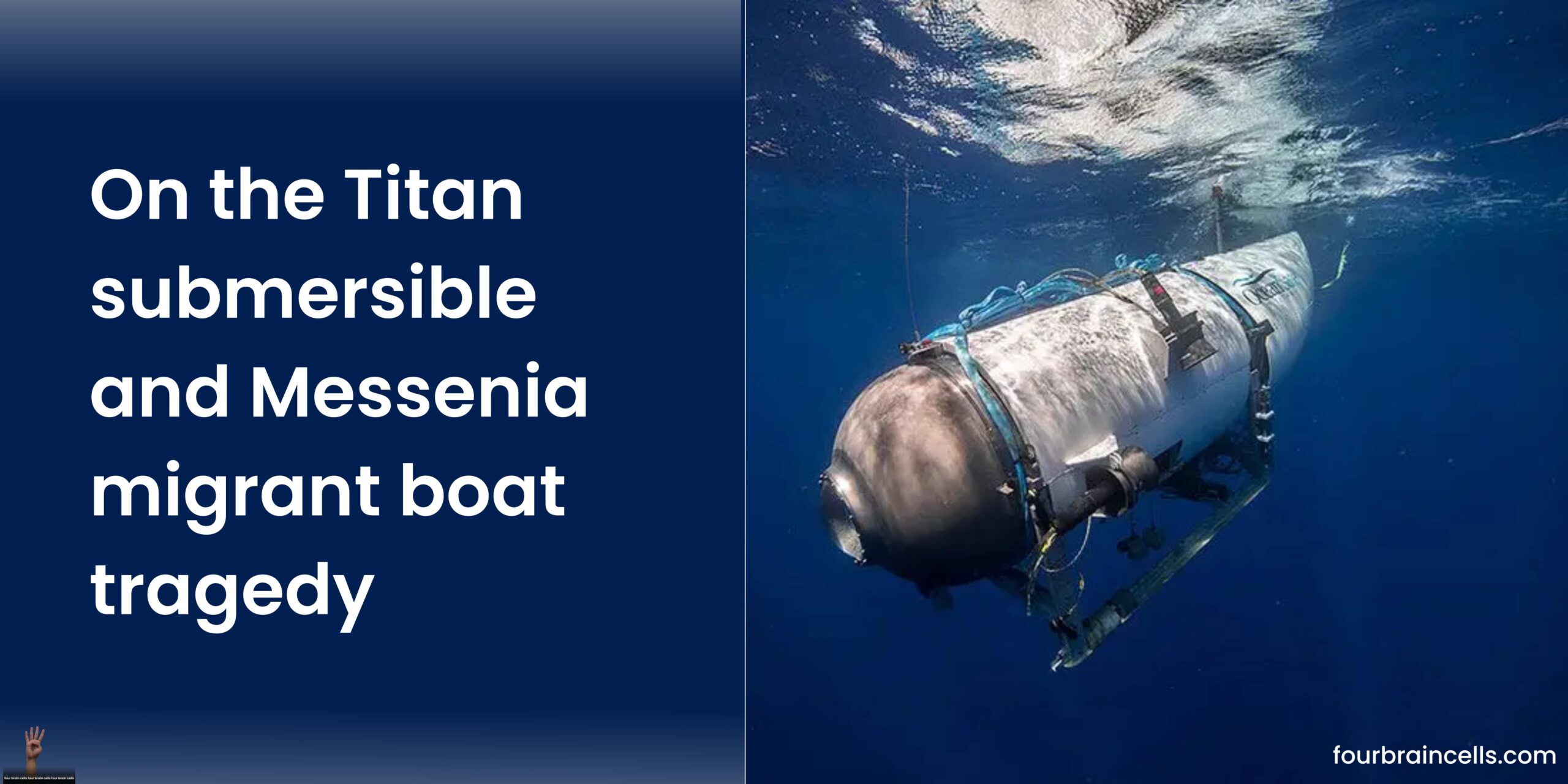Picture this: Five rich men are trapped (willingly) in a small carbon-fiber vessel can.
They’re on a journey 12,500 feet deep into the sea, but suddenly, the mother ship stops getting a response from them.
Will they survive?
Diving into parallels
Soon after the Titan submersible lost signal, the US Coast Guard, Navy, and other international forces sent help for the rescue mission.
Alas, after an intense search operation, none could be saved in what is termed a catastrophic implosion (the water down there has enormous pressure, which it exerts on the vessel wall causing it to collapse inwards).
4 days before this incident, on the 14th of June, roughly 400-750 refugees and migrants aboard a boat were on their way to Italy, or in human terms, freedom.
The boat had far more people than it could carry and eventually capsized.
79 people were reported dead, and around 500 may still be missing.
However, fairly less media attention and rescue operations were given to this incident, with social media users heavily criticizing the media’s dichotomy in representing the two sides.
You’ll hear different variations of this tragedy: that the Greek Coast Guard tried to help but the passengers refused, that the boat sank because the Greek authorities tried to tow it away, or that the boat didn’t move at all before sinking.
According to The Guardian, survivors also reported that Pakistanis, women, and children were moved to the lower decks of the boat; which were more danger-prone areas. (Sadly, we see the Matthew principle manifesting itself yet again. Titanic, much?)
Here’s the problem though: we might never know what really happened.
After all, the only sources we have right now are news channels- and you damn well know they’re fairly debatable.
The availability heuristic
Drawing parallels between these two incidents’ media coverage reminds me of a mental shortcut that we use in everyday life: the availability heuristic.
The availability heuristic means making decisions based on whatever you can think of easily, rather than going deep and analyzing your options.
Talking about it in Humans, Tom Phillips writes:
“It’s why sensational news stories about horrible crimes make us think that crime levels are higher than they are, whereas dry stories about falling crime statistics don’t have anywhere near as much impact in the opposite direction. It’s one reason why many people are more scared of plane crashes (rare, dramatic) than they are of car crashes (more common and as such a bit less exciting).”
Perhaps this is why the numbers of sinking boats escape our eye; but a catchy, intriguing titan submersible rescue operation with vivid details is much easier to remember and talk about.
It’s a mere coincidence that they happened together, but it also is the doom of humanity to take sinking boats as a “common, everyday” act.
These two tragedies undoubtedly bring a lot to the surface: the rich and poor divide, media control, the callousness by which we discuss deaths today, and the capitalization of humanity’s empathy.

Collateral damage
Both the tragedies, I’d say, are collateral damage: damage to 4 other lives for the sake of one guy who decided safety was too overrated; and damage to 70-odd lives at the cost of improperly governed migration policies and human smugglers.
A headline by TheOnion mocking this entire ordeal sums it up in the most real way possible:
Critics say submersible should’ve been tested with poorer passengers first.
Reading that alone gives me chills.
Social media users also heavily trolled the decisions of these men; especially after knowing that the Titan submersible was not entirely safe.
But wait, isn’t that why most of us want to get rich anyway?
To be able to do things without thinking twice, to feel the power of doing whatever you want, however you want.
I agree some decisions were irrational, but why the ‘’eat the rich’’ sentiment now?
That said, my point is to bring to light the eclipsing of media coverage, the “help” available for both incidents, and how most of us, arguably, find the Titan submersible more worthy of our attention.
Either incident, on its own, is a tragedy one wouldn’t wish upon anyone. It’s purely coincidental that they occurred one after the other, maybe to serve as a jolting reminder of the ‘diversities’ of lives lived.
Nonetheless, there’s one Orwellian truth that rings true even today, as seen in that boat of 700 people:
All animals are equal, but some are more equal than others.
Please note that while I’ve tried to include reliable sources, this blog is entirely subjective.

Leave a Reply